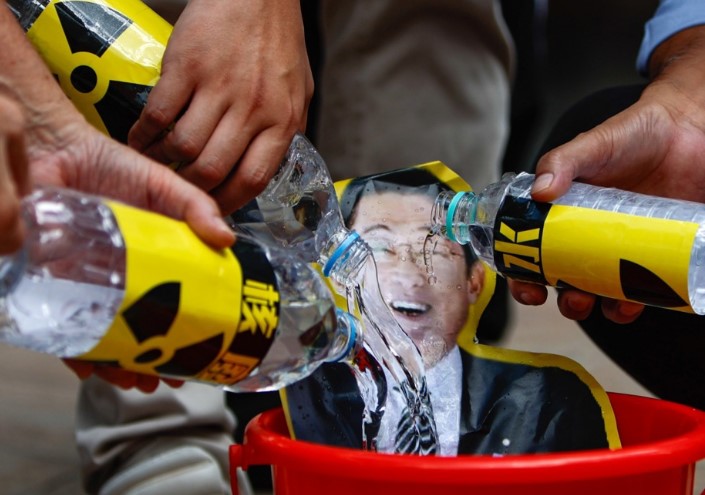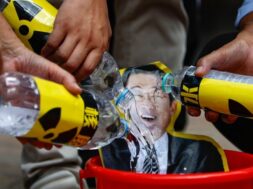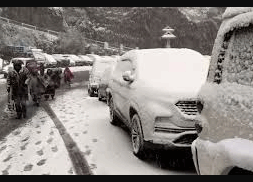
Fukushima: Chinese protest, abuse Japanese after release of ‘contaminated’ waters into the Pacific
Virendra Pandit
New Delhi: Water wars to control this elixir of life are common in several countries. But the Chinese are angry at their Japanese counterparts for releasing allegedly ‘contaminated’ waters from the ill-fated Fukushima nuclear power plant into the Pacific Ocean.
The Fukushima nuclear disaster was caused by a powerful earthquake and the tsunami it triggered on March 11, 2011. The twin disasters damaged the nuclear power plant’s emergency generators, causing a loss of power and leading to three nuclear meltdowns, as many hydrogen explosions, and the release of radioactive contamination.
Japan has for long been planning to release the stored Fukushima water which it said had been completely treated and had no radioactivity, meeting all international norms for nuclear safety.
But that has not satisfied Japan’s old bete noire, China.
As soon as Japan released the Fukushima waters into the Pacific Ocean on Thursday last week, thousands of Chinese allegedly made crank calls to the Japanese, forcing Tokyo to summon Beijing’s Ambassador to register a protest.
Tokyo said a flood of nuisance calls from China to local businesses had been received.
Also, the Japanese Embassy in Beijing urged thousands of Japanese living in China to keep a low profile and desist from talking loudly in public, the media reported on Monday.
Japan’s Deputy Foreign Minister Masataka Okano told Chinese Ambassador Wu Jianghao that China should properly inform the public “rather than unnecessarily raising people’s concerns by providing information that is not based on scientific evidence,” the foreign ministry said in a statement released in Tokyo.
On Thursday last, China banned all seafood imports from its neighbor after Japan started releasing cooling water from the Fukushima plant in an operation that Tokyo and the United Nation’s nuclear watchdog have said is safe. Tokyo reiterated that seawater around the Fukushima nuclear plant does not contain any detectable levels of radioactivity.
Since then, apparently, randomly chosen Japanese businesses ranging from bakeries to aquariums have reportedly received thousands of sometimes abusive crank calls from Chinese telephone numbers.
Social media users in China posted recordings and videos of these calls, some of which have attracted tens of thousands of likes and a large number of comments.
“Since the start of the discharge… There have been numerous phone calls and other harassment regarding the discharge that are suspected of originating from China. The situation has not improved since then,” Okano told Wu.
“A number of similar incidents are also happening in China against Japan-related facilities. This is extremely regrettable and we are deeply concerned,” he said
On Monday, Japan said it had increased security measures outside Japanese schools and diplomatic missions in China where, the media said, stones and eggs were thrown at Japanese schools.
Japan started releasing over 500 Olympic swimming pools’ volume of wastewater from Fukushima into the Pacific, 12 years after the disaster knocked out three reactors in one of the world’s worst atomic accidents. Over one million metric tons of treated radioactive water from the nuclear power plant was scheduled to be released into the Pacific.
Plant officials said that all radioactive elements have been filtered out, except for tritium, levels of which are within safe limits.
Test results since the start of the discharge have confirmed this, according to Japanese authorities. But fishing communities and others both at home and abroad worried about the environmental impact.
One Japanese restaurant chain received over 1,000 calls, the media reported.
The abusive calls came from telephone numbers with Chinese dialing codes with callers usually speaking in Chinese, English, and Japanese language. They strongly opposed Japan’s move to release treated radioactive nuclear water.
China expressed deep concern about the potential for radioactive contamination in Japan’s food and radioactive products exported to China, according to a statement from Chinese customs officials.
Japan and scientific organizations have said that the water, distilled after being contaminated by contact with fuel rods when the reactor was destroyed in a 2011 earthquake and tsunami, is now safe.
Tokyo Electric Power has been filtering the water to remove isotopes, leaving only tritium, a radioactive isotope of hydrogen that is hard to separate.
Japan’s fisheries agency also clarified that fish tested in waters around the plant did not contain detectable levels of tritium. South Korea also said it saw no scientific problems with the water release but environmental activists argued that all possible impacts have not been studied.
In 2014, a Scientific American article stated that tritium is relatively harmless because its radiation is not energetic enough to penetrate human skin, but when ingested at levels above those in the released water it can raise cancer risks.
The water disposal process will take decades to complete alongside the planned decommissioning of the plant.














